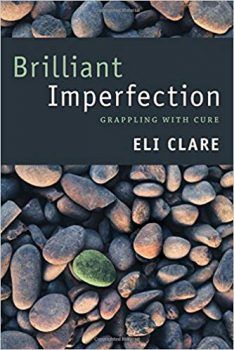Ashley Miller at the Quarterly Conversation:
 This “the ideology of cure” also focuses on the future of the disabled individual rather than on their present. Clare points out how various forms of activism often promote cure as the only response to body-mind difference and loss. For example, charity walks and runs exclude disabled individuals from participation and focus on the fear of becoming different or acquiring disability through a disease like cancer or cerebral palsy, rather than strive toward health and longevity of life for those that are suffering.
This “the ideology of cure” also focuses on the future of the disabled individual rather than on their present. Clare points out how various forms of activism often promote cure as the only response to body-mind difference and loss. For example, charity walks and runs exclude disabled individuals from participation and focus on the fear of becoming different or acquiring disability through a disease like cancer or cerebral palsy, rather than strive toward health and longevity of life for those that are suffering.
In his final two chapters, Clare prompts his readers to turn away from the “normal.” He challenges us to stop attempting to locate the body-minds of strangers on maps—diagnostic maps, racial and ethnic maps, gender maps. The book challenges preconceived notions of disability and difference, as Clare explores the meanings of cure, the connections between disability and social/environmental injustices, and the violence done by categorizing body-minds as “abnormal” and “unnatural.” He argues that there is nothing inherently wrong with disabled body-minds, even as they differ from the norm.
more here.
